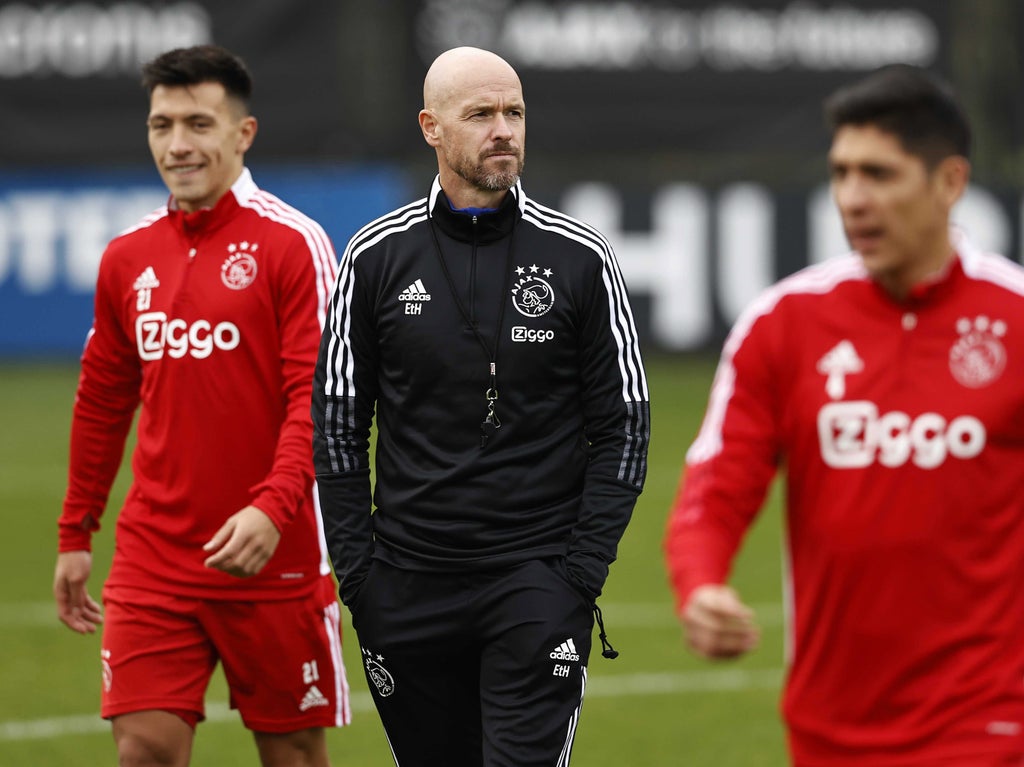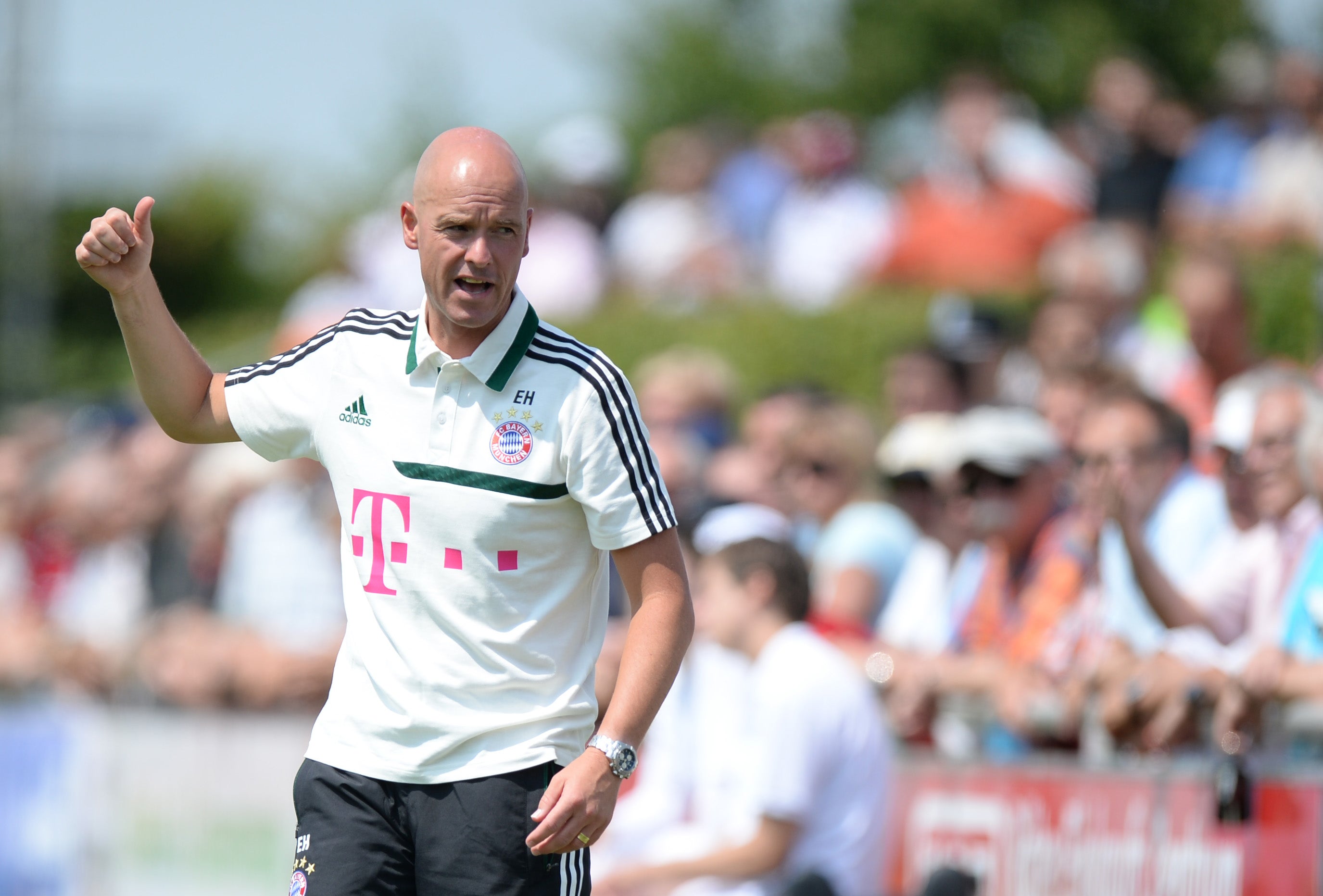
It would take Marnix Kolder an hour and a half to make the 87-mile trip from his home in Westerlee near Groningen to attend training in Deventer, then another hour and a half to make his way back. When he joined the modest, second-tier Dutch outfit Go Ahead Eagles, he told himself that he would only stay for two years at most.
At the start of his second season at Go Ahead, there was one day when the long commute was especially inconvenient. His wife had to visit the hospital. Go Ahead had played a game the previous day too. The session would just be a light one. “It was only running training,” he tells The Independent. “I thought it wasn't important.”
Kolder knocked on the door of his newly-appointed manager’s office and asked if, just this once, he could be excused. Erik ten Hag raised his finger. “Marnix, every training is important when you train with me.” Kolder would have to come in to work just like everybody else. “Then I knew what kind of trainer I was dealing with.”
Back then, Ten Hag had only just started his first head coach job. He was a long way away from becoming the most coveted coach in European football and ‘strict’ is a word that comes up regularly when you speak to those who played under him during those early days.
“He was a serious trainer who knew how he wanted it but he wanted to keep control of everything, always wanted to be in control," says Kolder, who is still playing today at the age of 41 for Oud Zwart Wit in Groningen. There were no corners cut, no half yards, no inches given.
“Even if we had to do runs in the woods,” recalls Sjoerd Overgoor, the fulcrum of Ten Hag’s Go Ahead midfield. Overgoor and his team-mates were told to complete a circuit through the local forest in two minutes flat. “To show him we were fit, we'd try and do it in 1:50. He said: ‘No, if I say two minutes it's not 2:10 or 1:50. It's two minutes.”
Ten Hag had brought his playing career to an end at Twente a decade earlier to take up a role overseeing the club’s academy, run jointly alongside Heracles Almelo. An impressive track record of youth development brought promotion to Twente’s first team coaching staff and a brief, season-long overlap with Steve McClaren the year before he won the Eredivisie.
It was McClaren’s predecessor, Fred Rutten, who Ten Hag had worked closest with at Twente though, and he joined him at PSV Eindhoven in 2009. Despite only enjoying modest successes over the course of two and half seasons working under Rutten, Ten Hag’s reputation as one of the brightest young coaches in Dutch football grew.
When he left PSV with Rutten before the end of the 2011-12 season, a number of second division clubs called. Go Ahead were his choice, and despite being his first head coach role, Ten Hag’s methods quickly began to convince his players that they were working with a talented manager.
“Behind every training session, there was an idea,” Kolder, Go Ahead’s captain at the time, says. “He makes every player better. Tactical, physical. Erik left nothing to chance. He was prepared for every opponent, down to the last detail.”
“Every morning he'd go to the pitch to see if the grass was high enough,” adds Overgoor, and this rigorous attention to detail was deliberate. It helped to inform a highly structured style of play that was all about replicating patterns, memorising movements and sweating the small stuff.
One of Ten Hag’s regular sessions during his pre-season was similar to the ‘shadow play’ made famous by Arrigo Sacchi, except these 11 vs 0 games were played with a ball to practise and perfect attacking shape and movement. “It was really boring,” Overgoor admits, “but he'd want us to focus and try every time, again and again and again.”

Slowly, after many hours on the training ground, the rotations and repetitions became almost automatic. “When I had the ball, Marnix would know exactly what to do. The left-forward would know what to do. After a couple of months, we already knew: ‘Oh yeah, this is what we played 11 vs 0 for.’ We'd see the way Erik wants us to play and we’d play like that.”
Eventually, this would make in-game adjustments and responding to setbacks easier. “If we had a difficult time, maybe at half time, he'd change something simple like: 'You have to play five metres more to the left and problem solved'. It was so easy and we didn't see it. He'd turn it around and in the second half we'd be better than the opponent.”
The actual style of play at Go Ahead was conditioned by the level of opposition and the “kick and rush” typical of the Dutch second division. Both Kolder and Overgoor can see differences in Ten Hag’s style then and now due to the greater technical quality of players at his disposal at Ajax but recognise a few core, progressive principles.
“He believed that football wins,” says Kolder. “He wanted short passes. When the opponent pressed, then you played in the striker for a one against one. No long balls. It's really Ajax school, short passes over the grass.” These passes could never be straight or predictable though.
“Always diagonal,” says Overgoor, “because then your body is more open. You'd see more space. These were easy things but I'd never thought about it. I'd always ask for straight balls. But if I'd run a little bit different, I'd have an open body and see more space in front. These little details just made me play a lot easier.”
It took time for some to adjust, though, and Ten Hag’s one and only season at Go Ahead was not a runaway success. Results were mixed and inconsistent as the players adapted to his methods and at no point during the regular season did they win more than two games back-to-back. There were times, early on, when Overgoor wondered if he was suited to the style.
“In the first five or six weeks of pre-season I was thinking he hated me,” he says. “He was constantly shouting at me that I did something wrong, I had to do more of this, more of that.” It came to the point where he felt he had to sit down with his new manager to straighten out their differences.
Ten Hag had recently replaced the door to his office, fitting a new one with a window. “My first thought was that he wanted to see everything, have everything under control,” he says, “but it was just to make it comfortable for us to step into his office.” Overgoor credits the subsequent conversation with fulfilling his ambition of being a top-flight player.
“He said: “You're the type of player who is maybe satisfied with 80% of you but I'm sure if I make you angry or more aggressive, that 80% will get to 100% or maybe 110%.' Then every time he shouted, I knew I had to do more because he expected more from me,” he says. “If he hadn't changed my thinking, maybe I was just a second division player.”

Go Ahead finished in sixth-place and qualifying for the play-offs was hardly an extraordinary feat - more than half the league did - but things had clicked by that late stage of the season. Three two-legged ties - one against top-flight VVV-Venlo - were won by an aggregate score of 13-4 sent Go Ahead back to the Eredivisie for the first time in 17 years.
Kolder had long stopped worrying about his commute. “I'd get in my car with pleasure,” he says. “Under Erik, I found out what it took to be serious about professional football. He gave me tools you need to win games and play good football, like responsibility and to always be prepared for everything.” He signed a new contract, extending his stay another two years.
The only issue? Ten Hag would not be sticking around. “I called him twenty times to stay but he didn't,” Kolder adds. An opportunity to manage Bayern Munich II, arriving at Säbener Strasse the same summer as Pep Guardiola, was too good an opportunity to turn down even if it meant swapping top-flight Dutch football for the German fourth tier.
After two years at Bayern and a season-and-a-half of helping Utrecht to punch above their weight, Ajax came calling. The run to the Champions League semi-finals in 2019 made Ten Hag known to even those with a casual interest in European football and his reputation has only grown in the years since, and much of the interest around Ajax’s last-16 tie against Benfica is around where he could manage next.
“What's important for Erik I think is the people around him,” says Kolder. “The structure, the director, the assistant trainer. He works with the whole team and he has to have confidence and trust in them.”
“He has a path in his head and he's not distracted by anything and anyone,” Kolder adds. “Everyone has an opinion but he follows his own plan. That's Erik.”







